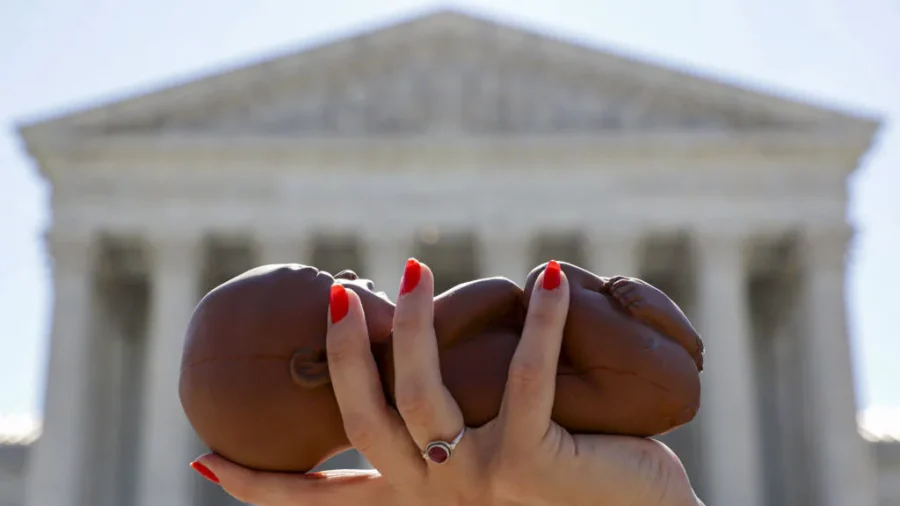A federal judge in Louisiana has blocked enforcement of a rule in two states that required employers to provide accommodations to employees who want to undergo elective abortions, with the judge siding with plaintiffs who argued that abortions aren’t “medical conditions” that employers must facilitate.
U.S. District Judge David Joseph announced the ruling in an order filed on June 17 at the U.S. District Court for the Western District of Louisiana, granting a preliminary injunction in a lawsuit against the U.S. Equal Employment Opportunity Commission (EEOC), which he found exceeded its authority in implementing the rule.
The EEOC “exceeded its statutory authority” in issuing the rule and “unlawfully expropriated the authority of Congress and encroached upon the sovereignty of the States Plaintiffs,” wrote Judge Joseph.
The temporary relief, which applies to Louisiana and Mississippi until a final judgment is entered in the case, blocks the EEOC from initiating any investigation into claims that a covered employer failed to accommodate an elective abortion that is not necessary to treat a medical condition related to the pregnancy.
The injunction also prevents the EEOC from taking any action that would allow employees to pursue legal action against their employers for not accommodating elective abortions.
The EEOC did not immediately respond to a request for comment on the preliminary injunction.
The order is a consequence of two consolidated lawsuits, one brought by the attorneys general of Louisiana and Mississippi, and the other by the U.S. Conference of Catholic Bishops, Catholic University, and two Catholic dioceses.
The Lawsuit
The subject of the legal challenge was a final rule was issued by the EEOC in April implementing the Pregnant Workers Fairness Act in a way that included abortion in the definition of “pregnancy, childbirth, or related medical conditions.”
The EEOC stated in a note in the Federal Register that a number of the comments received urged the agency to exclude abortion from this definition, with “many” commenters expressing the view that “abortion is the destruction of human life, … is objectionable for moral or religious reasons, and … is not health care.”
While the EEOC said that it recognized these objections as “sincere, deeply held convictions” that are “often part of an individual’s religious beliefs,” it said that it also received many comments in favor of including abortion in the definition on the premise that abortion is a “necessary part of health care” and that the religious beliefs of an employer “should not dictate an employee’s ability to receive a reasonable accommodation” for one under the Pregnant Workers Fairness Act.
EEOC said in the note that the “reasonable accommodation” called for in the rule would not include requiring an employer to pay any travel-related expenses for an employee to get an abortion but would be limited to granting an employee’s request for time off to get the procedure done and recover from it.
The EEOC said that its decision to keep the abortion provision was consistent with its own interpretation of Title VII of the Civil Rights Act of 1964, a federal law that prohibits an employer from discriminating against employees based on sex, race, religion, national origin, color, and pregnancy.
The attorneys general of Louisiana and Mississippi, as well as the U.S. Conference of Catholic Bishops and other groups, sued the EEOC over the rule, which was slated to go into effect on June 18. They argued that inclusion of abortion under the definition of pregnancy-related medical conditions was an attempt to hijack the provisions of the Pregnant Workers Fairness Act to impose a national abortion exception.
Two of the plaintiffs, Louisiana Attorney General Liz Murrill and Mississippi Attorney General Lynn Fitch, issued a statement praising the judge’s decision to issue an injunction.
“The Biden Administration continues to re-write laws in ways Congress never intended, which violates the United States Constitution,” Ms. Murrill said. “We are grateful the District Court blocked the rule.”
“We appreciate the court’s thoughtful opinion and look forward to working toward a commonsense implementation of the Act, which would accommodate pregnant women while respecting state laws to protect life,” Ms. Fitch said.
In a separate lawsuit, a coalition of GOP-led states led by Arkansas and Tennessee sued to block the rule. In that case, a federal judge in Arkansas ruled last week that the plaintiffs lacked standing. Eastern District of Arkansas U.S. District Judge D.P. Marshall, Jr. denied the states’ request for a nationwide preliminary injunction.
Arkansas Attorney General Tim Griffin expressed disappointment in the ruling and said in a statement to media outlets that he is “considering all legal options and [remains] confident we will ultimately be successful.”
From The Epoch Times

